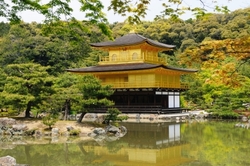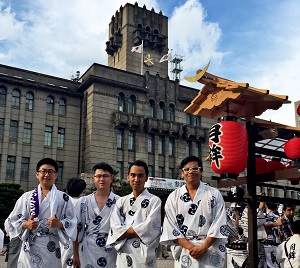Living in Kyoto
Living and Studying in Kyoto
A safe, exciting, and fascinating country—and one fully integrated into the dynamic Asian economy—Japan is an excellent place to study for your MBA. Doshisha Business School is located in the ancient capital of Kyoto, which lies at the heart of the broader Kansai economy.
Kyoto – ancient capital and modern city

Home to 17 UNESCO World Heritage sites, Kyoto is the city of choice for innovators, academics, and all those wishing to surround themselves with a fascinating balance of the past, present, and future. While traditional Kyoto draws tourists from all over the globe to its temples and gardens, modern Kyoto offers everything that the resident or visitor could desire: exciting shopping districts, a safe and fun night life, a variety of natural and spiritual pursuits and institutions, and access to Japan's international hub cities of Osaka and Kobe. The "Kansai" region of Japan (centered around Kyoto-Osaka-Kobe) offers a multicultural environment with China-towns, Korea-towns, and a huge range of cultural and entertainment events.
Kansai – a global business hub

With the largest number of manufacturers in the country, Kansai is regarded as the industrial heart of Japan and is deeply connected with the broader Asian economy. Many leading Japanese companies, including Nintendo, Panasonic, Kawasaki, Itochu, Sharp, Daihatsu, Daikin, Kyocera and Omron, were established or are headquartered in the region, and Doshisha Business School maintains strong relationships with local industry. With cutting-edge research institutes and dozens of universities, Kansai is a major R&D center, boasting a large number of high-tech science parks and next-generation industrial clusters. One third of global lithium-ion battery production, for instance, is based in Kansai, and the region’s firms hold a 70% share of the domestic market for solar cells. Many leading multinationals, including AstraZeneca, Bayer Healthcare, P&G, Haier, Recaro and Nestle, have also chosen Kansai as their Japanese base.
Getting involved with the local community

Global MBA students involved in social and cultural events outside of class.We encourage students to become involved in the local community during their stay in Kyoto, through volunteer activities such as international exchange at local schools or by participating in cultural events such as Gion Matsuri, one of Japan’s most famous festivals, held in Kyoto during July. Experiences like these offer a great chance for you to enrich your stay in Kyoto and Japan.
Part-time work
As a Global MBA student, your first priority should be to focus on your business education. For this reason, we strongly encourage all students to ensure that they have sufficient financial resources to support themselves during their MBA program. At the same time, we recognize that the cost of living and studying in Japan can be relatively high, and that students may sometimes need to find part-time work to earn extra income.
In order to work in Japan, student visa holders must first apply for a special work permit from the local immigration office. With this permit, you will be able to work up to 28 hours per week while school is in session, and up to 8 hours a day during vacation periods.
Once permission to work has been obtained, part-time jobs may be found in a number of sectors, including language teaching, tutoring, hospitality and tourism, and specialized fields for which you have particular skills. (Please be aware that most part-time jobs will require at least an intermediate level of Japanese language ability.) There are also a limited number of opportunities to be employed by DBS faculty as teaching or research assistants.
Living Expenses
Actual living expenses vary from student to student, but a self-supporting international student with a moderate student lifestyle can expect to spend approximately 134,000 yen per month. A student with one or two family members may need to spend from 1.5 to 2 times more.
Breakdown of typical monthly living expenses in Kyoto (in Japanese yen)
| Cost | Note | ||
|---|---|---|---|
| Housing | Rent(1) | 50,000 | A single room with a kitchen and bath(2) |
| Utilities | 10,000 | Electricity, Gas, Water | |
| Daily Expenses | Meals | 40,000 | Including eating out |
| Telecommunications | 10,000 | Internet, mobile phone | |
| National Health Insurance | 1,000 | ||
| Academic Materials | Course Materials(3) | 3,000 | |
| Miscellaneous | 20,000 | Including recreation | |
| Total | 134,000 | ||
- You may need to pay a deposit, key money, or agent's commission when you sign a housing contract. Landlords may ask for 1 month’s rent, key money and/or a deposit in advance. This varies from area to area.
- If your room is unfurnished you will need to purchase furniture and electric appliances. The cost of these will depend your lifestyle but typically you can expect to spend around 70,000 yen.
- At the beginning of each semester, you may need to purchase textbooks or case studies for the classes you register for.
- The above amounts are a guide only. Please adjust according to your individual needs and lifestyle.